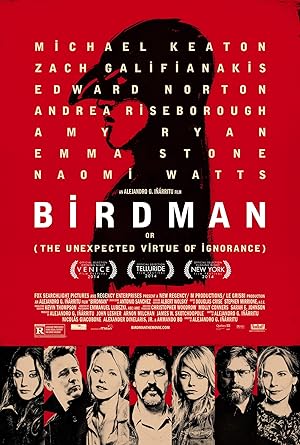I finally found a film made by Alejandro G. Iñárritu that I didn’t hate: Birdman: or (The Unexpected Virtue of Ignorance)! I hated the overwrought 21 Grams and Babel so I skipped Biutiful in spite of promises of the hot Javier Bardem. How did Birdman: or (The Unexpected Virtue of Ignorance) tempt me to go back to the movie theater? First, I really like the cast: Amy Ryan, Edward Norton, Emma Stone and Zach Galifianakis. I’ve always had a soft spot for Michael Keaton, but not enough to see White Noise or Multiplicity so I was eager now that he had a quality project. Second, Birdman: or (The Unexpected Virtue of Ignorance) takes place in NYC so even if the movie was crap, it would be beautiful. Third, I actually like the premise/trope, “Hey, Let’s Put on a Show” as a way to save something or someone. Fourth, I love the premise of a washed up comic book movie actor trying to redeem his career in theater and then casting actors who either starred or were at least in major comic book movies [Michael Keaton (Batman), Edward Norton (The Incredible Hulk) & Emma Stone (Gwen Stacy from The Amazing Spider-Man)]. What did I actually think when I finally saw the film? I had a good time while watching it. Birdman: or (The Unexpected Virtue of Ignorance) was philosophically ambitious without inducing eye rolling fits like The Congress. Birdman: or (The Unexpected Virtue of Ignorance)’s central concern was do I matter? One of my favorite mean sayings (that I would like to think that I created) is, “Your mother lied to you. You aren’t special.” Ultimately it is a question of am I loved? And if you are loved, do you feel loved or does the right person love you? Is it possible to make a connection? Is it enough to just love your self? Is that delusion/mental illness/narcissism or if you love yourself enough and make that delusion real, isn’t that another way of creating art? I do not know a lot about Buddhism, but I think delusion/illusion/art may be connected in a spiritual way. I also enjoyed the way that Birdman: or (The Unexpected Virtue of Ignorance) kept punching through the fourth wall-illustrating Keaton’s character, Riggan Thomson internal dialogue with Birdman and revealing where his delusion (his delusion is depicted, but not without objective analysis; thus I would not classify this film as a magical realist film) and reality ends and begins (hint: cabdrivers & producers know), looking at the world behind the play, exposing the world behind the newspaper, discussing what made a relationship fail. There is a constant puncturing of reality to show the real behind the surface, which in itself is an illusion because it is all a movie. Birdman: or (The Unexpected Virtue of Ignorance) was also a cinematic technical delight. Everything looks like it was shot in one take, which of course it wasn’t, like a play. There are a few shots that I adore and want to put in my pocket: the scene where Keaton is on the rooftop and in the distance, you can see a poster of Henry Cavill in Man of Steel, and another where he is on the sidewalk and in the left background, you can see a Broadway marquee for Tom Hanks in Lucky Guy. Birdman: or (The Unexpected Virtue of Ignorance) is in a constant tug of war between theater and movies–theater needs movie stars to gain more interest from the masses while looking down on what the masses usually love and movies look to theater to elevate it. In the end, that war is futile, and neither win because YouTube and Twitter has snuck in and stolen the prize. It is an old war already lost or won depending on which side of the coin you decide to look at as Greek mythology in poetry and tragedy (Icarus) gives way to Shakespeare (MacBeth) and Shakespeare gives way to movies. Keaton’s face plays a spectrum of emotions as he runs around Times Square in his underwear. The preview wisely does not explain why he does it, and I won’t reveal it here. Keaton runs through a mixture of determination, terror, discomfort, equanimity as he tries to simultaneously greet and ignore the crowds and anger as he ultimately fails to do so. All these lofty questions are secondary to the story, which has humor and pathos, generally works, has character development (even the unnamed crew members are interesting) and ends ambiguously. I did not mind the ending and am fine with it being interpreted either way, but I think that ambiguity did contribute to the fact that as soon as I left the theater, I left Birdman: or (The Unexpected Virtue of Ignorance) behind me. I would not recommend Birdman: or (The Unexpected Virtue of Ignorance) to people who hate ambiguous endings or think that anything that I wrote sounds pretentious. I would recommend Birdman: or (The Unexpected Virtue of Ignorance) to people who enjoy independent films that require complete focus. It is better to see it on the big screen as opposed to DVD because it requires your complete attention to appreciate the editorial genius.




